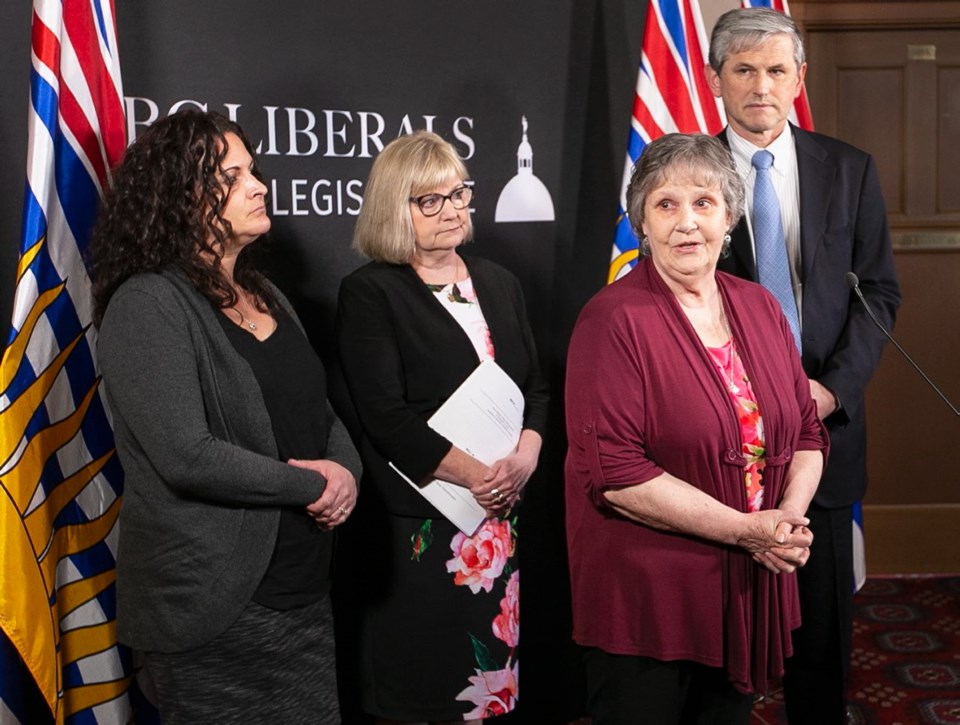The family of murdered Langford teen Kimberly Proctor is renewing its call to pass legislation that would force at-risk youth with mental-health or addictions issues into treatment before they harm themselves or others.
The Safe Care Act, which was introduced for a third time Wednesday by Liberal MLA Jane Thornthwaite, would require court-mandated treatment and counselling for any young person at risk of self-harm, substance abuse, violent behaviour and sexual exploitation.
The 18-year-old Proctor was raped and murdered in March 2010 by Kruse Wellwood, then 16, and Cameron Moffat, then 17. The two were tried as adults and sentenced to life in prison with no possibility of parole for 10 years.
At a news conference on Wednesday, Proctor’s grandmother, Linda Proctor, said both Wellwood and Moffat showed clear warning signs of violent behaviour leading up to her granddaughter’s death.
Aunt Jo-Anne Landolt said that if mandatory treatment had existed at the time, her niece might still be alive.
“Kruse Wellwood and Cameron Moffat both spiralled out of control while their school, their community, their peers watched,” she said.
“Nothing was done, and we are forever asked: ‘Why was nothing done about these two boys?’ ”
Landolt criticized Premier John Horgan, whose riding of Langford-Juan de Fuca covers the area where Proctor was killed, for not meeting with the family to hear their concerns.
Since her death, Proctor’s family has been fighting for reforms to the youth mental-health system. Landolt said nine years later, the pain is still raw.
“I believe it will always be raw for our family,” she said.
The proposed legislation, also known as Kimberly’s Law, would make parents responsible for their children’s actions if they don’t attempt to get them help.
“This act will save youth lives,” said Thornthwaite, Opposition critic for mental health and addictions. For youth struggling with addictions, those who are released prematurely after an overdose are at risk of overdosing again, she said. Thornthwaite said while voluntary treatment should be the first option, in some cases, mandatory treatment might be the only effective solution.
The Safe Care Act has been introduced in the legislature twice before, most recently in 2018, but it did not garner enough support to be voted into law.
Judy Darcy, minister of mental health and addictions, said the act poses complications, including those around forcing someone into treatment.
“It is a complicated issue, there are charter issues involved,” she said. “There are people on both sides of the issue who are very passionate — people who say you can put a child at greater risk if there is coercion involved.”
Darcy cited an article co-authored by former provincial health officer Perry Kendall and published last year in the Canadian Medical Association Journal, which found that forcing a person into treatment could potentially put youth at greater risk.
The article said forced care could cause mental distress and foster distrust in the medical system and social services.
Darcy said she has met with the Proctor family, as well as many parents who have lost children to drug overdoses, and said she takes their concerns seriously. “It’s their concerns and their loss that guide me every single day in the work we’re doing to improve mental health and addictions care for children and youth in our province.”
B.C. representative for children and youth Jennifer Charlesworth said she has major concerns about “secure” or involuntary treatment because it can irreparably damage the relationship between the youth and their guardians or care providers.
“Should we not do more [preventive treatment] at the front end, and what is it we can do to make them safe in a supportive environment rather than an incarcerated environment?” Charlesworth asked.
She noted there is already a mechanism under the Mental Health Act to commit someone deemed to be a risk to themselves or others.



